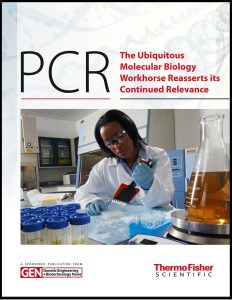In this eBook, sponsored by Thermo Fisher Scientific, we examine the rising role of genetics in medical diagnostics, including polymerase chain reaction (PCR), genomic sequencing, and gene-based micro-biome disease association. This collection of articles looks at the dramatic increase in prevalence of PCR testing since the onset of the COVID-19 pandemic, and explores the possibilities of still deeper, wider spread clinical applications for PCR in the not-so-dis-tant future. As the prominence of PCR continues to climb, we analyze various methodologies to improve its efficiency, and offer insights on the most suitable laboratory equipment to ensure accuracy and precision when performing Real Time PCR (qPCR). The need for precision and accuracy when performing and precision when performing Real Time PCR (qPCR). The need for precision and accuracy when performing qPCR is paramount. It is an extremely sensitive assay and slight differences due to pipetting errors can be disastrous. We look at the impact that lab equipment has on performance when preparing samples, miniaturizing qPCR assays and simplifying standard curve preparations. Also, a discussion on the benefits of automating qPCR, such as saving time and avoiding repetitive motion injuries.
The increased role of genome sequencing in surveilling—and potentially combatting—the COVID-19 pandemic is also studied with an eye on growing sequencing programs across the United States, something emphasized by both the Centers for Disease Control and Prevention (CDC) and the World Health Organization (WHO). Underscoring this critical need in a recent study, WHO stated, “The accelerated integration of genome sequencing into the practices of the global health community is a must if we want to be better prepared for the future threats.” We attempt to understand how the US remains lagging far behind other countries in viral genome surveillance.
Meanwhile, a dive into the discovery that people with gut microbiota that contain the same collections of bacteria appear more likely to have certain health conditions. A 2021 study analyzed the genetic makeup of bacteria in the human gut, and linked groups of bacterial genes to disorders including atherosclerotic cardiovascular disease, cirrhosis of the liver, inflammatory bowel disease, colorectal cancer, and type 2 diabetes. “Overall, our work is not only a step towards gene-based, cross-disease microbiome diagnostic indicators, but it also illuminates the nuances of the genetic architecture of the human microbiome, including tension between gene- and species-level associations,” wrote the research team.
Sponsored by:


